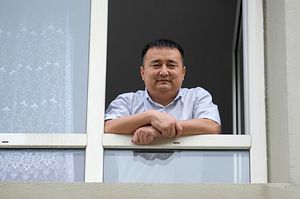Serikzhan Bilash’s trial ended unexpectedly on Friday with a bittersweet result. The rights activist who kicked the hornet’s nest repeatedly over the internment of ethnic Kazakhs in Xinjiang by Chinese authorities accepted guilt on incitement charges and was released with a fine, a three-month travel ban, and a promise to end his activism.
Bilash celebrated with his family and supporters on Friday at a restaurant in Almaty. As the AFP reported, Bilash explained his plea deal in simple terms: “I had to end my activism against China. It was that or seven years in jail. I had no choice.”
In March, Bilash was arrested in charges that he incited inter-ethnic hatred against Chinese in a speech in which he called for an “information jihad.” Bilash, an ethnic Kazakh born in Xinjiang who then migrated to Kazakhstan and gained citizenship, had been at the center of a movement to publicize the disappearance of ethnic Kazakhs in Xinjiang. Kazakhstan’s authorities in the years after independence issued a resounding call to ethnic Kazakhs elsewhere in Central Asia and China to return. The returnees — called oralman — were given a quick path to citizenship. This policy created thousands of families with cross-border ties.
So when Chinese authorities began herding the Muslims of Xinjiang — Uyghurs, Kazakhs, Kyrgyz, and others — into “re-education centers” (or as the Chinese call them “vocational training centers”) their relatives across the border noticed and sounded the alarm.
In early March, before Bilash was arrested, I wrote about two recent reports about the situation in Xinjiang: “Reports like those in Foreign Policy, by AFP, and by others are critical to global understanding of what’s happening in Xinjiang. They’re rooted in access to Kazakhstan and the courage of Kazakhs willing to speak up.”
“When will the Kazakh window into Xinjiang close?” I asked.
A few days later, Bilash was arrested. Although he was arrested in Almaty, he was taken to Nur-Sultan on house arrest for a few months — even though his home was in Almaty. A judge sent the case back to Almaty in late July.
According to the AFP, Bilash’s lawyer was unable to contact her client on Friday evening. When she was given access, she refused to sign the plea Bilash had agreed to — stressing that Bilash was innocent.
“I refuse to put my name to any deal that was signed under pressure,” Aiman Umarova reportedly said. Umarova also served as counsel for for Sairagul Sauytbay, an ethnic Kazakh Chinese citizen who provided early details on the Xinjiang camps. Sauytbay, who had fled to Kazakhstan, was not deported to China, but Kazakh authorities denied her asylum — she’s in Sweden now.
“I had to do this for my family and my children,” Bilash told his supporters, the AFP reported.
Bilash has done significant work to draw attention to the situation in Xinjiang; it is a special kind of tragedy that he is being silenced. While Bilash said that his organization, Atajurt, would continue its work, the message is clear: Nur-Sultan will brook no more firebrands on this issue. The Kazakh authorities have demonstrated a tried and true technique to silence inconvenient movements: targeting their leaders. Bilash couldn’t be co-opted, so he was threatened and ultimately it worked.
It is good that Bilash is free — he deserves to be — but Kazakhstan is all the poorer for his forced silence.
































